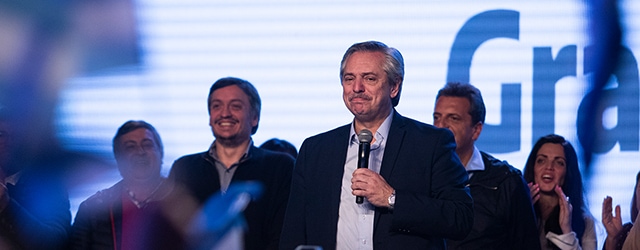Argentina’s new Peronist government must resolve the country’s economic crisis.
 Argentine President lberto Fernández |
|
ARGENTINA: VITAL STATISTICS |
|---|
|
Location: South America |
|
Neighbors: Chile, Bolivia, Paraguay, Brazil, Uruguay |
|
Capital city: Buenos Aires |
|
Population (2020): 44,998,458 |
|
Official language: Spanish |
|
GDP per capita (2019): US$11,683.90 |
|
GDP growth (2018): -2.5% |
|
Inflation (2018): 54.4% |
|
Currency: Peso |
|
Investment promotion agency: Argentine Agency for Investment and International Trade |
|
Investment incentives available: Various tax incentives |
|
Ease of Doing Business rank (2019): 126 |
|
Corruption Perceptions Index rank (2019): 85 |
|
Political risks: No apparent risk of contagion from problems in Chile; government weakened by unpopular austerity measures; widespread public discontent |
|
Security risks: Protests and labor strikes frequent; judiciary inefficient and costly, judiciary independence below world average; widespread corruption |
|
PROS |
|---|
|
Appointment of economist Martín Guzmán as minister of the economy; Guzmán’s expertise includes key areas such as sovereign debt. |
|
CONS |
|---|
|
Decline in M&A likely to continue |
|
Street crime |
|
Rising unemployment |
|
Uncertain economy |
|
Zika virus |
|
Sources: AM Best Country Risk Report, BNamericas, Buenos Aires Times, The Guardian, MercoPress, The Rio Times, Transparency International, UK Foreign Travel Advice, US Department of State, World Bank, World Population Review, International Monetary Fund |
|
For more information, check out Global Finance‘s Argentina Economic Report data page. |
Last October, Argentine elections brought a Peronist, Alberto Fernández, into office as president—a dramatic political comeback for a party whose long hold on power had ended four years earlier.
Even before taking office, and repeatedly since, Fernández has declared that Argentina is in “virtual default” on its national debt, spooking already-frightened investors who understood the country owed some $300 billion—more than half its annual GDP—to the International Monetary Fund (IMF) and other creditors.
The previous government had focused on getting its fiscal house in order. In exchange for $57 billion in staggered bailout money from the IMF, former President Mauricio Macri had implemented austerity, including increased taxes and reduced subsidies. Yet inflation had soared and the peso was plummeting against the dollar.
Now the comparatively orthodox economic policy of Macri appears to have given way to renewed economic populism under Fernández. Peronism, named for two-time president Juan Domingo Perón, eludes precise definition, and has at different times accommodated left-leaning and right-leaning governments.
Fernández campaigned against the IMF and multinational-driven austerity. Since election, he has raised taxes on wealth, temporarily frozen utility rates, and provided financial relief in various forms to farmers, retirees and parents. Other initiatives include higher export tariffs and increased taxes on currency exchanges and some financial transactions.
While these will cause some pain for exporters, they could also raise revenues, resulting in a lower deficit, says Gabriel Torres, vice president and senior credit officer, sovereign and subsovereign, at Moody’s Investors Service.
Still, he calls it a “huge problem” that in Argentina “there is no continuity in basic macroeconomic policy.”
Positives and Negatives
On the fiscal front, the new president has some positive developments to build on. One is the primary deficit, which includes government revenues and expenses but excludes interest, and will hover around 0.5% of GDP for 2019, Torres estimates, a drop from previous years.
On the political side, the new government can expect a honeymoon, which in Argentina typically lasts for approximately a year, according to Raimundo Soto, economics professor at Pontificia Universidad Católica de Chile in Santiago. “Those putting pressure on Macri will back off to see what happens,” he predicts.
The new government may receive a further financial breather. Interest payments on national debt represent approximately 3.5% of GDP, Torres says; the government is proposing to push out those payments for several years to reduce the fiscal pressure. “There will be some loss to investors,” Torres says. “How much of a loss, we don’t know.”
The new government will have to tread carefully, however, since it did not score an overwhelming election landslide. Fernández will need at least some support from the opposition to survive.
And his team’s honeymoon has a uniquely Argentine aspect. Argentine politicians have frequently been trailed by charges of corruption. Fernández’s vice president, Cristina Fernández de Kirchner, faces charges stemming from her tenure as president. Depending on the outcome, her case could taint the new government as well. “That would penalize investment and growth,” Soto says.
With this mix of positive and negative factors, Argentina’s future appears uncertain. A sour economy contributed hugely to Macri’s defeat, and his successor will need a sure hand not to suffer the same fate. “It’s like opening a fortune cookie,” Soto concludes. “It’s extremely difficult to say.”



